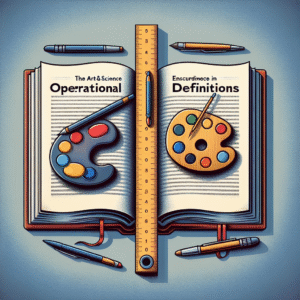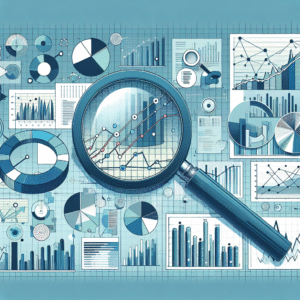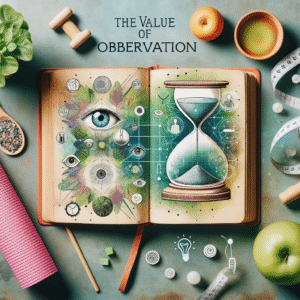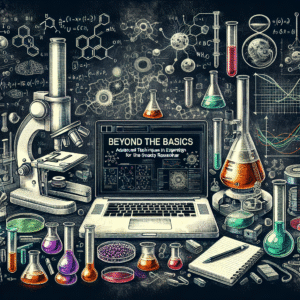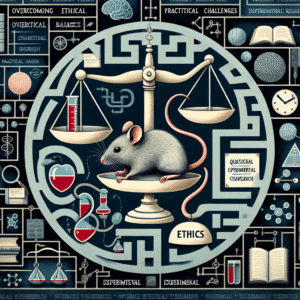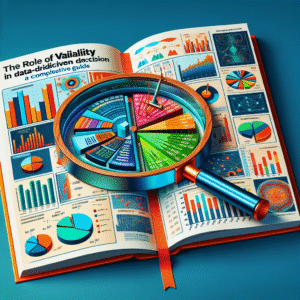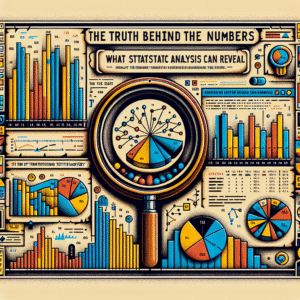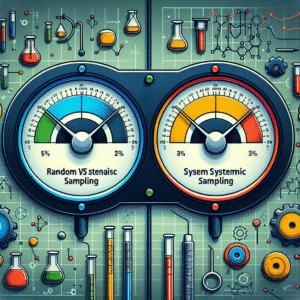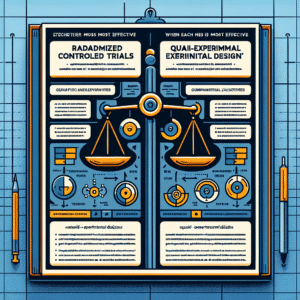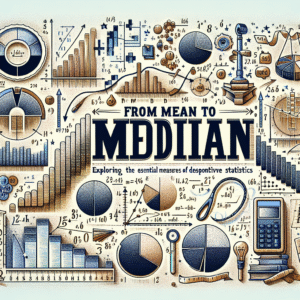Introduction In an era where consumers are bombarded with choices, the question "What makes a product truly reliable?" looms large. Durability isn’t merely a feature; it’s a promise from manufacturers that their products can withstand the tests of time and use. As we delve into the depths of this question, we find that reliability spans beyond mere physical endurance....
Research Methods in Psychology
research methods in psychology
Introduction In the intricate world of research, where every detail matters, there’s an often-overlooked hero: operational definitions. The art and science of operational definitions are essential for crafting clarity and consistency. Imagine embarking on a journey to explore the cosmos, yet failing to define your destination. Wouldn’t your mission be plagued by confusion and misdirection? In much the same...
Introduction In today’s data-driven world, the quest for success hinges on the ability to analyze and interpret data effectively. The cornerstone of any analytical endeavor lies in the relationship between independent and dependent variables, particularly the latter. Measuring Success: The Critical Role of Dependent Variables in Data Analysis unfolds a tapestry of insights that will deepen your understanding of...
Introduction Imagine conducting a complex survey aimed at understanding consumer behavior. You collect data and analyze it, only to find that your results are skewed because you overlooked the role of independent variables. This oversight can lead to misguided strategies and lost opportunities in any discipline—from business to healthcare to social sciences. In statistical analysis, mastering the concept of...
Introduction In today’s fast-paced world, decisions often need to be made almost instantaneously. In sectors such as healthcare, marketing, and policy-making, quick and accurate assessments can significantly influence outcomes. This urgency emphasizes one crucial aspect of research design: the necessity for speed without sacrificing utility. When time is of the essence, cross-sectional research stands out as a vital tool....
Introduction Imagine waking up every day with a sense of purpose, vitality, and a deeper understanding of your own wellness. Now, what if I told you that much of this knowledge stems not from fads or fleeting trends, but from years of meticulous observation? That’s where longitudinal studies come into play. The value of observation in these studies illuminates...
Introduction: A Journey from Perception to Insight In our fast-paced world, where myriad data points swirl around us, "From Trends to Truths: How Correlational Studies Shape Our Understanding of Complex Issues" stands as an essential lens through which we can decode the complexities of human behavior, societal trends, and scientific inquiries. Why do certain diets seem effective for some...
Introduction In an era dominated by data, the ability to interpret and analyze quantitative information has never been more pivotal. Mastering Statistical Analysis: Tools and Techniques for Quantitative Research empowers researchers, businesses, and data enthusiasts to turn raw numbers into actionable insights. Whether you’re paving the way in academia or driving decisions in a corporate setting, understanding statistical analysis...
Introduction: Bridging the Gap Between Numbers and Narratives In an era dominated by data analytics and algorithms, the narrative often delves into numerical statistics, leaving the human experience overlooked. This brings to the fore the essential role of qualitative research in today’s data-driven world. While quantitative data paints a broad picture, qualitative research digs deeper, uncovering the motivations, thoughts,...
Introduction In an era where data drives decisions, the ability to gather meaningful insights is paramount. Whether you’re a business seeking customer feedback, a researcher exploring social patterns, or a non-profit measuring impact, the stakes have never been higher. Enter the world of surveys—where The Art of Asking: Designing Surveys that Yield Meaningful Responses becomes pivotal. This comprehensive guide...
Introduction In the world of research, ordinary approaches simply won’t cut it anymore. The landscape is evolving, demanding more sophisticated methodologies that not only yield robust results but also enhance the credibility of your findings. Welcome to "Beyond the Basics: Essential Techniques in Experimental Design for the Savvy Researcher," where we’ll explore advanced methods that elevate your research from...
Introduction In our rapidly evolving world, the value of gaining insights through structured investigation cannot be overstated. For researchers, organizations, and entrepreneurs, conducting a successful pilot study serves as a vital first step in translating ideas into impactful actions. It allows for essential testing of hypotheses, methodologies, and systems, effectively minimizing risks before full-scale implementation. This article will provide...
Introduction In an increasingly complex world where scientific inquiry must navigate ethical considerations and practical constraints, researchers often find themselves at a crossroads. While randomized controlled trials (RCTs) are hailed as the gold standard for establishing causality, they are not always feasible or ethical in every situation. This is where the art and science of quasi-experimental research shine, providing...
Introduction Have you ever felt the frustration of theory falling short when faced with real-world challenges? You’re not alone. In the realms of psychology, economics, and various social sciences, the divide between theoretical frameworks and practical applications can often seem insurmountable. Enter Field Experiments: Bridging the Gap Between Theory and Practice—a powerful methodology that allows researchers to test theories...
Introduction In today’s fast-paced world, understanding ourselves and the people around us has never been more crucial. Emotional intelligence (EI) has emerged as a key competence, influencing everything from personal relationships to professional success. Yet, despite its significance, many individuals struggle to develop and harness their emotional capabilities effectively. This is where psychometrics steps in. Harnessing the Power of...
Introduction Imagine trying to make a vast ocean of data manageable, navigating through waves of numbers and patterns to extract insights that inform critical decision-making. In today’s data-driven world, the ability to analyze and interpret statistical information isn’t just beneficial—it’s essential. Statistics Unmasked: Understanding the Key Concepts of Inferential Analysis reveals how inferential statistics can empower you, enabling predictions...
In the rapidly evolving landscape of data analysis, few concepts are as vital yet often overlooked as descriptive statistics. Whether you’re a business owner striving for growth, a researcher seeking to uncover insights, or a data analyst aiming to tell compelling stories with numbers, mastering this foundational aspect of statistics is crucial. Descriptive Statistics 101: Essential Tools for Data-Driven...
Introduction In the world of academia and clinical research, time is a precious commodity. The longer a study takes to start, the more the research question loses its urgency. Institutional Review Board (IRB) approvals are critical hurdles that can slow down this process significantly. Fast-Tracking Your Research: Strategies for Expedited IRB Approval offers a roadmap through this maze, ensuring...
Introduction In the realm of healthcare, few concepts are as fundamental yet as complex as informed consent. This principle is not just a nicety; it’s a legal and ethical cornerstone that ensures patients understand their rights and the implications of their medical treatments. When it comes to pediatrics, however, the landscape shifts significantly. Children are not small adults; their...
In the intricate world of research, where the boundaries of discovery and ethical responsibility often blur, Ethical Review Boards (ERBs) emerge as the unwavering Guardians of Integrity. Their role is not just about compliance; it’s about safeguarding the participants’ rights and ensuring the validity of research results. This article delves into the pivotal influence of ERBs, illuminating their essential...
Introduction Research is the backbone of progress in medicine, psychology, and social sciences, among others. Whether it’s a lifesaving drug, a groundbreaking psychological theory, or a sustainable environmental solution, research informs our understanding and shapes our future. At the heart of many scientifically rigorous studies lies a crucial element: control groups. But with the power of control groups comes...
Introduction In the quest for knowledge, science thrives on the principle of objectivity. How can researchers ensure that their findings are not swayed by biases—whether conscious or unconscious? The answer often lies in a powerful methodology known as the double-blind trial. In this article, we will explore "Science Without Prejudice: The Importance of Double-Blind Methodology in Trials," focusing on...
Introduction The realm of social sciences can often seem murky; decisions, policies, and interventions can be informed by countless variables. Amid this complexity, one principle stands out as a beacon of clarity: random assignment. Crafting clarity: The role of random assignment in social science studies is not merely an academic exercise; it’s essential for establishing robust findings that can...
Introduction In an age where data reigns supreme, understanding how to leverage it effectively is essential for any organization striving for success. Yet, with the influx of data comes the challenge of distinguishing between noise and valuable insights. This brings us to a pivotal concept: validity. The role of validity in data-driven decision making is not merely academic; it’s...
Introduction Imagine pouring countless hours, resources, and ambition into a product, only for it to face disastrous failure in the market. The hard truth is that many innovative ideas die not due to a lack of creativity but because they fail to meet basic reliability standards. This is where reliability testing becomes not just important but essential. "From Concept...
Introduction Imagine reading a scientific paper where the term "success" could refer to various outcomes — from a medication’s efficiency to a psychological patient’s progress. Without clarity about what "success" means in that context, interpretations can diverge wildly, leading to confusion and miscommunication. This is where the concept of operational definitions comes into play. Defining your terms: the role...
Introduction Research is the backbone of advancement in virtually every field, from the sciences to the social sciences. Understanding the intricacies of how data interacts and informs outcomes is essential for drawing accurate conclusions. One of the most pivotal elements in any research design is the dependent variable. In this article, we’ll explore The Significance of Dependent Variables: How...
Introduction In the vast landscape of research, data analysis, and decision-making, the relationship between independent variables and dependent outcomes is a central theme. Exploring the impact of independent variables on dependent outcomes is not just an academic exercise; it is fundamental to understanding how change occurs in various fields, from healthcare to marketing and beyond. This guide aims to...
Introduction In an era where information flows seamlessly at lightning speeds, the concept of Dynamic Data stands at the forefront of technological evolution. Variables in programming and data science have transitioned from mere placeholders to dynamic elements that mold how we interpret, process, and leverage information. Whether in artificial intelligence, real-time data analytics, or personalized user experiences, understanding dynamic...
Introduction: Unlocking the Power of Data Have you ever been baffled by numbers? You’re not alone. In today’s data-driven world, understanding the nuances of statistical significance can be the difference between a successful decision and a misguided one. Whether you’re a seasoned data analyst or a curious newcomer, comprehending the intricacies of hypothesis testing is essential. In this article,...
Introduction In a world overflowing with data, the ability to interpret numbers effectively is more than just a skill; it’s a necessity. From business decisions to social policy and even personal health, statistical analysis serves as a beacon of clarity in a fog of information. But what is the truth behind these numbers? What secrets can they unveil? This...
Introduction In the world of research and data collection, the methods you choose can significantly impact your results. Whether you’re a student tackling your first thesis or a seasoned researcher diving into a complex study, understanding the nuances of different sampling techniques is essential. Among these techniques, random and systematic sampling stand out as two powerful methodologies. But which...
Introduction In the vast realm of medical research and data analysis, the methodologies employed can pivot the findings in significantly different directions. The cornerstone of evidence-based medicine rests on understanding these methodologies, primarily observational studies and randomized trials. Each approach possesses distinct characteristics, strengths, and weaknesses that can influence outcomes in critical ways. This article dives deep into the...
Introduction In today’s fast-paced world, understanding complex scenarios through clear, compelling examples is crucial. Case studies stand out as powerful tools for educators, marketers, and business leaders alike. They serve as windows into real-world applications of theories and ideas, illuminating the path for both practitioners and students. In this article, we will embark on a deep dive into case...
Introduction In a world inundated with data and research, the ability to distill complex findings into actionable insights is paramount. Cross-sectional studies have emerged as a popular method for researchers looking to capture a snapshot of a population at a single point in time. This article, titled Cross-Sectional Studies 101: What You Need to Know About This Research Method,...
Introduction Imagine an intricate puzzle, the pieces scattered across a vast table. Each piece represents a slice of life, depicting individual circumstances, socioeconomic statuses, and opportunities across generations. When connected, these pieces reveal a larger picture of social and economic mobility. This metaphor encapsulates the essence of Connecting the Dots: How Longitudinal Studies Illuminate Social and Economic Mobility. As...
Introduction In a world overwhelmed by information, decoding the data becomes not just essential, but crucial in harnessing insights that can drive innovation and understanding across various fields. From healthcare to economics and social sciences, correlational studies have emerged as a powerful methodology, allowing researchers to examine relationships between variables without necessarily proving causation. In this article, we will...
Introduction In the age of information, the phrase "data is the new oil" has gained considerable traction. But what does it mean to harness this vast reservoir of data effectively? More importantly, how does quantitative research play a pivotal role in advancing science? Quantitative research offers methodologies that allow scientists to collect, analyze, and interpret numerical data, unlocking insights...
Introduction In a world increasingly influenced by quantitative data, the rich tapestry of human experience captured through qualitative research is often overshadowed. Yet, understanding human behavior, cultural contexts, and individual motivations requires a nuanced approach—one that qualitative methodologies can provide. From Interviews to Ethnography: A Guide to Diverse Qualitative Approaches delves into the transformative power of qualitative research, providing...
Introduction In today’s fast-paced world, understanding the pulse of the community—its needs, desires, and frustrations—has never been more critical. Organizations that can effectively harness this information stand to benefit immensely, forging connections that turn casual consumers into loyal advocates and stakeholders. This article explores Harnessing the Voice of the People: Key Findings from Our Latest Survey, delving into insights...
Introduction In the realm of scientific research, the effectiveness of an experiment often hinges on its design. Whether you’re a seasoned researcher or a budding scientist, understanding how to navigate the intricate landscape of experimental design is crucial. Poorly constructed experiments can lead to misleading results, wasted resources, and even the halt of entire research projects. That’s why knowing...
In the grand tapestry of scientific inquiry, what seems to be the main attraction—the final results, the breakthrough discoveries—often overshadows the vital groundwork that makes those accomplishments possible. Enter pilot studies: the unsung heroes of scientific research. Often overlooked and underappreciated, pilot studies play a pivotal role in shaping larger research endeavors. This article explores the indispensable contributions of...
Introduction In the ever-evolving landscape of research methodology, two giants often square off: Randomized Controlled Trials (RCTs) and Quasi-Experimental Designs (QEDs). At first glance, RCTs may appear as the gold standard. However, QEDs are not to be underestimated, as they offer unique advantages in specific scenarios. Understanding the nuanced differences between these methodologies is essential for researchers, policymakers, and...
Introduction Have you ever considered how a small change in teaching methodology could lead to unexpectedly profound results in student learning? In the realm of education, where the quest for innovative ways to engage students is ever-present, recent field experiments have unearthed surprising results that could redefine our understanding of effective teaching practices. These unexpected outcomes are not just...
Introduction Imagine a classroom where traditional standardized tests are replaced by a sophisticated system of insights that not only evaluates knowledge but also fosters emotional well-being, critical thinking, and creativity. This is not a distant dream; it’s the unfolding reality of the future of psychometrics in education. From Tests to Insights: The Future of Psychometrics in Education signifies the...
Introduction In the vast realm of research, conclusions are only as sound as the methods used to arrive at them. As we maneuver through data, whether qualitative or quantitative, the importance of scientific rigor cannot be overstated. Why Inferential Statistics is Essential for Sound Research Conclusions is not just a tagline; it is the cornerstone of credible, reliable findings....
Introduction: Unlocking the World of Data In today’s data-driven society, understanding how to interpret and utilize information is crucial. Whether you are a business executive analyzing sales figures, a student grappling with class averages, or a data scientist sifting through complex datasets, the importance of descriptive statistics cannot be overstated. Among these statistics, two of the most frequently discussed...
Introduction In a world where research can significantly influence healthcare, policy-making, and social norms, ensuring that studies adhere to ethical standards is paramount. Enter Institutional Review Boards (IRBs), the guardians of ethical research practices. The importance of IRB review cannot be overstated—it is the cornerstone that safeguards the rights and welfare of research participants while fostering scientific innovation. In...
In the intricate world of healthcare, few concepts are as essential and yet as vulnerable to misinterpretation as informed consent. The principle of informed consent is supposed to empower patients, providing them with the autonomy to make well-informed decisions about their medical treatments. However, numerous barriers obstruct this critical process, leading to disparities that can have grave consequences for...
Introduction In the world of research, the journey from an idea to a published paper is not merely a technical process; it is a profound ethical obligation. This journey encapsulates the aesthetic and ethical responsibilities researchers hold toward their subjects, their institutions, and society at large. The importance of maintaining ethical standards throughout the research process cannot be overstated....
Introduction Imagine you’ve just conducted a groundbreaking study that claims your new supplement can significantly boost cognitive function. Exciting, right? But how do you ensure that your results are trustworthy? Herein lies the beauty of control groups. Control Groups 101: Why They Matter in the Quest for Reliable Results isn’t just academic jargon—it is a crucial cornerstone of scientific...
Introduction In the intricate world of medical and psychological treatments, the quest for effectiveness reigns supreme. Imagine being part of a medical breakthrough that not only saves lives but also enhances the quality of life for countless individuals. This is where the importance of double-blind research comes into play. Exploring the Effectiveness of Treatments: The Role of Double-Blind Research...
Introduction Imagine a world where every hypothesis could be tested on an even playing field, where biases are minimized, and every participant’s chance of being chosen for a study is equal. This dream is not as far-fetched as it may seem: it’s a reality made possible through fair and rigorous research methodologies. In this article, we will explore "Fairness...
Introduction Imagine you’re a student eager for a university degree. You study hard, pour over textbooks, and ace practice tests. But when exam day comes, the test you take doesn’t truly measure what you’ve learned; instead, it distorts your capabilities based on irrelevant criteria. This scenario highlights a critical issue in education: the importance of validity in educational testing....
Introduction In today’s fast-paced world, where instant gratification is the norm, consumers often find themselves at a crossroads between immediate satisfaction and long-term reliability. "Going the Distance: Evaluating Product Reliability in the Age of Instant Gratification" highlights this tension and explores how modern consumers can make informed choices that emphasize durability and performance over fleeting allure. With technology at...
Introduction When embarking on the journey of empirical research, one might overlook a seemingly trivial aspect: operational definitions. Yet, these definitions serve as the backbone for robust data analysis and scientific inquiry. They provide clarity and precision, ensuring that researchers communicate effectively and that data is interpreted accurately. Imagine if someone asked you to define "intelligence”—would you rely on...
Introduction Imagine embarking on a journey into the world of research without fully grasping the fundamental concepts that drive your inquiries. For those aspiring to become researchers, understanding the concepts of dependent and independent variables is as crucial as knowing the compass points for travelers. The distinction between these two types of variables is not only pivotal for setting...
Introduction Welcome to Independent Variables 101: Your Guide to Mastering Research Methodology! Understanding independent variables is not merely an academic exercise; it is pivotal for anyone looking to conduct meaningful and impactful research. Whether you’re a budding scientist, a graduate student, or a seasoned researcher, grasping the concept of independent variables can elevate your research skills dramatically. In an...
Introduction Imagine standing in a grocery store, faced with countless choices ranging from fruits to frozen meals. Every decision you make, from selecting the freshest apple to choosing a brand of cereal, hinges on various variables. These are the elements that shape our preferences, influence our choices, and ultimately determine the paths we take in life. Understanding variables in...
Introduction In the ever-evolving landscape of research and data analysis, hypothesis testing stands out as a critical component. It influences decision-making in fields ranging from scientific research to business analytics. Yet, the road to correct hypothesis testing is fraught with potential missteps. Understanding the common pitfalls in hypothesis testing and how to avoid them is essential for ensuring reliable...

